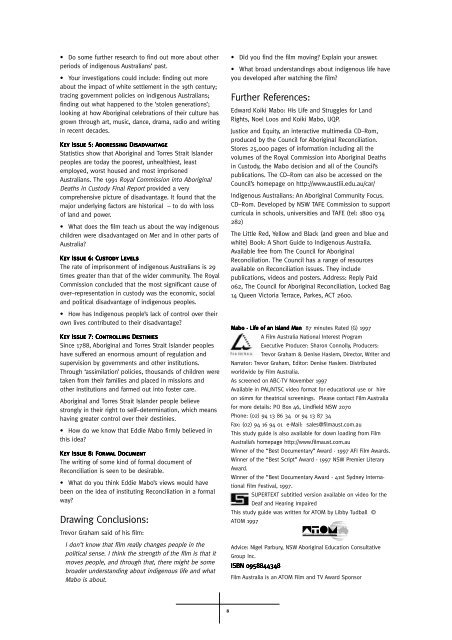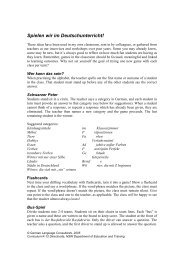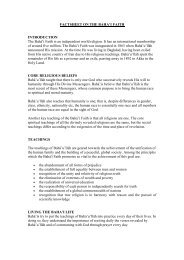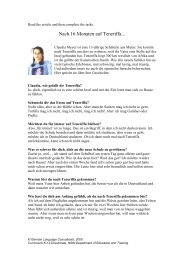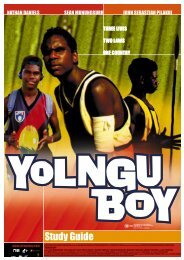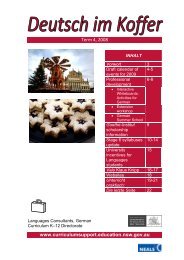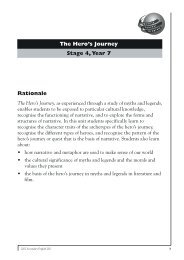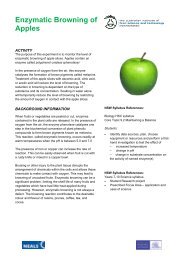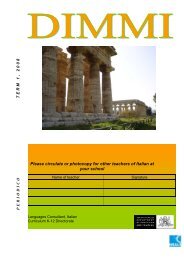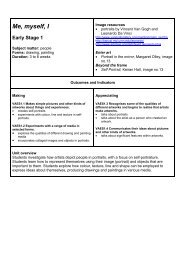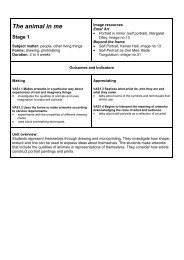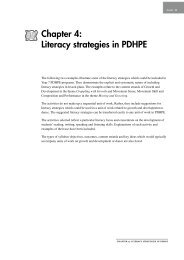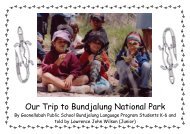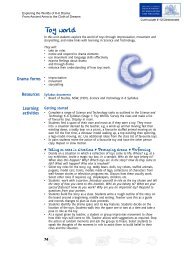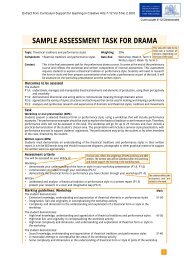Mabo Study Guide - Curriculum Support
Mabo Study Guide - Curriculum Support
Mabo Study Guide - Curriculum Support
You also want an ePaper? Increase the reach of your titles
YUMPU automatically turns print PDFs into web optimized ePapers that Google loves.
• Do some further research to find out more about other<br />
periods of indigenous Australians’ past.<br />
• Your investigations could include: finding out more<br />
about the impact of white settlement in the 19th century;<br />
tracing government policies on indigenous Australians;<br />
finding out what happened to the ‘stolen generations’;<br />
looking at how Aboriginal celebrations of their culture has<br />
grown through art, music, dance, drama, radio and writing<br />
in recent decades.<br />
Key Key Issue Issue Issue 5: 5: Addressing Addressing Disadvantage<br />
Disadvantage<br />
Statistics show that Aboriginal and Torres Strait Islander<br />
peoples are today the poorest, unhealthiest, least<br />
employed, worst housed and most imprisoned<br />
Australians. The 1991 Royal Commission into Aboriginal<br />
Deaths in Custody Final Report provided a very<br />
comprehensive picture of disadvantage. It found that the<br />
major underlying factors are historical – to do with loss<br />
of land and power.<br />
• What does the film teach us about the way indigenous<br />
children were disadvantaged on Mer and in other parts of<br />
Australia?<br />
Key Key Issue Issue Issue 6: 6: Custody Custody Custody Levels<br />
Levels<br />
The rate of imprisonment of indigenous Australians is 29<br />
times greater than that of the wider community. The Royal<br />
Commission concluded that the most significant cause of<br />
over–representation in custody was the economic, social<br />
and political disadvantage of indigenous peoples.<br />
• How has Indigenous people’s lack of control over their<br />
own lives contributed to their disadvantage?<br />
Key Key Key Issue Issue 7: 7: Controlling Controlling Controlling Destinies<br />
Destinies<br />
Since 1788, Aboriginal and Torres Strait Islander peoples<br />
have suffered an enormous amount of regulation and<br />
supervision by governments and other institutions.<br />
Through ‘assimilation’ policies, thousands of children were<br />
taken from their families and placed in missions and<br />
other institutions and farmed out into foster care.<br />
Aboriginal and Torres Strait Islander people believe<br />
strongly in their right to self–determination, which means<br />
having greater control over their destinies.<br />
• How do we know that Eddie <strong>Mabo</strong> firmly believed in<br />
this idea?<br />
Key Key Issue Issue 8: 8: Formal Formal Document<br />
Document<br />
The writing of some kind of formal document of<br />
Reconciliation is seen to be desirable.<br />
• What do you think Eddie <strong>Mabo</strong>’s views would have<br />
been on the idea of instituting Reconciliation in a formal<br />
way?<br />
Drawing Conclusions:<br />
Trevor Graham said of his film:<br />
I don’t know that film really changes people in the<br />
political sense. I think the strength of the film is that it<br />
moves people, and through that, there might be some<br />
broader understanding about indigenous life and what<br />
<strong>Mabo</strong> is about.<br />
8<br />
• Did you find the film moving? Explain your answer.<br />
• What broad understandings about indigenous life have<br />
you developed after watching the film?<br />
Further References:<br />
Edward Koiki <strong>Mabo</strong>: His Life and Struggles for Land<br />
Rights, Noel Loos and Koiki <strong>Mabo</strong>, UQP.<br />
Justice and Equity, an interactive multimedia CD–Rom,<br />
produced by the Council for Aboriginal Reconciliation.<br />
Stores 25,000 pages of information including all the<br />
volumes of the Royal Commission into Aboriginal Deaths<br />
in Custody, the <strong>Mabo</strong> decision and all of the Council’s<br />
publications. The CD–Rom can also be accessed on the<br />
Council’s homepage on http://www.austlii.edu.au/car/<br />
Indigenous Australians: An Aboriginal Community Focus.<br />
CD–Rom. Developed by NSW TAFE Commission to support<br />
curricula in schools, universities and TAFE (tel: 1800 034<br />
282)<br />
The Little Red, Yellow and Black (and green and blue and<br />
white) Book: A Short <strong>Guide</strong> to Indigenous Australia.<br />
Available free from The Council for Aboriginal<br />
Reconciliation. The Council has a range of resources<br />
available on Reconciliation issues. They include<br />
publications, videos and posters. Address: Reply Paid<br />
062, The Council for Aboriginal Reconciliation, Locked Bag<br />
14 Queen Victoria Terrace, Parkes, ACT 2600.<br />
<strong>Mabo</strong> <strong>Mabo</strong> - - Life Life Life of of of an an Island Island Man Man 87 minutes Rated (G) 1997<br />
A Film Australia National Interest Program<br />
Executive Producer: Sharon Connolly, Producers:<br />
Trevor Graham & Denise Haslem, Director, Writer and<br />
Narrator: Trevor Graham, Editor: Denise Haslem. Distributed<br />
worldwide by Film Australia.<br />
As screened on ABC-TV November 1997<br />
Available in PAL/NTSC video format for educational use or hire<br />
on 16mm for theatrical screenings. Please contact Film Australia<br />
for more details: PO Box 46, Lindfield NSW 2070<br />
Phone: (02) 94 13 86 34 or 94 13 87 34<br />
Fax: (02) 94 16 94 01 e-Mail: sales@filmaust.com.au<br />
This study guide is also available for down loading from Film<br />
Australia’s homepage http://www.filmaust.com.au<br />
Winner of the “Best Documentary” Award - 1997 AFI Film Awards.<br />
Winner of the “Best Script” Award - 1997 NSW Premier Literary<br />
Award.<br />
Winner of the “Best Documentary Award - 41st Sydney International<br />
Film Festival, 1997.<br />
SUPERTEXT subtitled version available on video for the<br />
Deaf and Hearing Impaired<br />
This study guide was written for ATOM by Libby Tudball ©<br />
ATOM 1997<br />
Advice: Nigel Parbury, NSW Aboriginal Education Consultative<br />
Group Inc.<br />
ISBN ISBN 0958844348<br />
0958844348<br />
Film Australia is an ATOM Film and TV Award Sponsor


